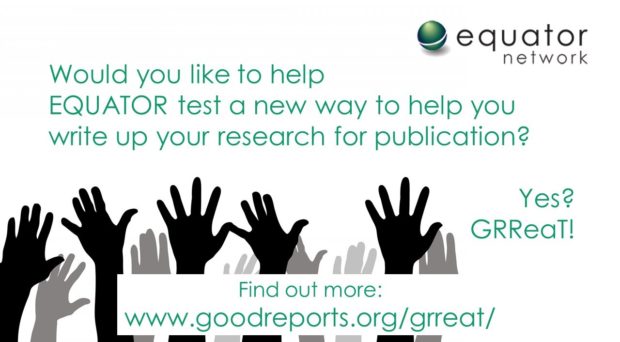
The UK EQUATOR Centre, based at the University of Oxford, is the foundation of the internationally recognised EQUATOR Network. The EQUATOR Network aims to improve the quality and transparency of health research, primarily by promoting awareness of reporting guidelines and providing education and training in good reporting practices.
Reporting guidelines such as CONSORT, STROBE, and PRISMA exist for all of the main study designs in health research, and there are hundreds of extensions and adaptations that cover different types of study and areas of medicine. The EQUATOR Library provides a one-stop shop for reporting-related resources, including a searchable database of reporting guidelines.
In 2018, the UK EQUATOR Centre developed and launched the GoodReports website to help authors find and use reporting guidelines when writing up research for publication. These guidelines ensure a clear and complete account of an author’s study, including the information needed for readers to understand exactly what was done, how, why, and the implications of the findings.
The development of the GoodReports website was inspired by the series Research: increasing value, reducing waste published in The Lancet in 2014. The final paper of the series, Reducing waste from incomplete or unusable reports of biomedical research, concluded that funding should be invested into the development and maintenance of infrastructure to support better reporting, more research on reporting, and wider implementation of its findings. The initial development and piloting work on GoodReports won the prestigious Cochrane-REWARD prize for its potential to reduce research waste.
The GoodReports website includes a reporting guideline finder – the “EQUATOR wizard” – which helps researchers identify the most appropriate reporting guideline for their paper. It delivers an online and downloadable checklist containing links to further explanation of individual points and provides examples of good reporting. These tools directly help authors in writing their paper as accurately and completely as possible. Authors are also encouraged to submit the checklist alongside their manuscript to their chosen journal, demonstrating explicitly that an appropriate reporting guideline has been followed.
In October 2021 we published an article in BMC Medical Research Methodology describing the user experience and behaviour of authors using the GoodReports website both inside and outside the journal manuscript submission process.
Data from this study suggested that reporting guidance would be more useful if delivered to authors earlier in the writing process. Data also suggested that guidance is less actionable when delivered in the most common “checklist” format. With this in mind we developed GoodReports further by using the checklist database to generate editable article templates, designed to make following and implementing guidance easier for the author.
As we move forward with additional research on the topic, we have started a study funded by the UK Medical Research Council, which is now recruiting authors to GRReaT, a randomized controlled trial to test whether authors given a GoodReports article template write more complete research articles. We are comparing a group given an article template containing items from the appropriate reporting guideline for their study with a control group simply given a reporting guideline recommendation and general reporting guidance.
We are looking for participants who are writing up the following types of health-related study
- Cohort study
- Case-control study
- Cross-sectional study
- Observational study in nutrition or dietetics
- Systematic review (of a healthcare intervention)
- Randomized trial of a pharmaceutical, medical device, procedure, or social or psychological intervention
As a thank you for participating in the trial, all trial participants receive a “completeness” report on their draft manuscript from reporting experts at the UK EQUATOR Centre. The report focuses on the methods and results sections of the manuscript and indicates to authors whether individual essential reporting items from the relevant reporting guideline have been reported adequately or need further clarification or additional information. The report also includes general writing tips to improve clarity and readability. This report can be used to improve their manuscript before they submit it, which could mean a smoother journey through peer review and the wider editorial process.
For more information on eligibility, please visit the GRReaT webpage or the trial pre-registration page on the Open Science Platform.
Comments